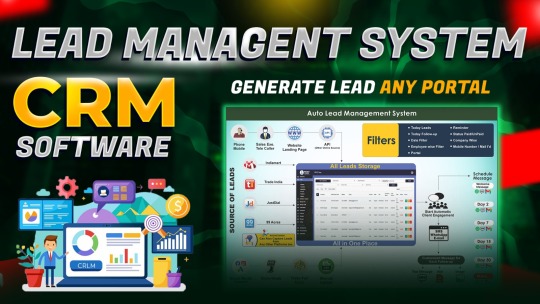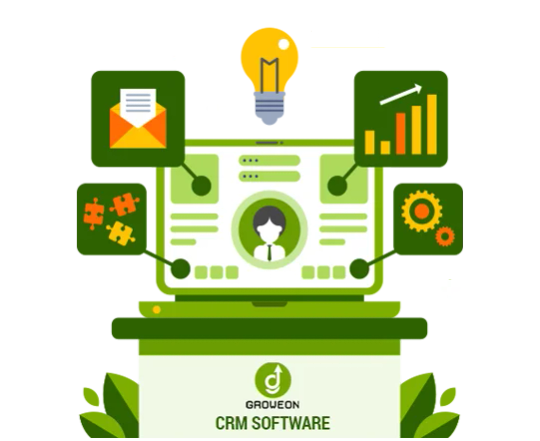#CRM Software for Sales Teams
Explore tagged Tumblr posts
Text
Boost Your Business with Sales and Lead CRM Management Software Quick Demo - Rocket Singh Software
In today’s competitive business landscape, managing sales leads efficiently is crucial for success. Rocket Singh Software offers one of the best Sales Lead CRM Management software, designed to streamline lead tracking, enhance customer interactions, and boost sales conversions. If you're looking for a quick demo of this powerful CRM software, this blog will walk you through its key features and benefits.

What is Lead Management?
Lead management software is the process of capturing, tracking, and nurturing potential customers until they convert into paying clients. A well-structured lead management system ensures that no opportunity slips through the cracks and helps sales teams maximize their efficiency.
Key Features of Rocket Singh CRM Software for Lead Management:
Automated Lead Capture: Seamlessly collect leads from multiple sources, including websites, social media, and emails.
Lead Scoring & Qualification: Prioritize high-quality leads based on predefined criteria.
Lead Assignment & Tracking: Distribute leads among sales representatives for efficient follow-ups.
Lead Nurturing & Engagement: Automated follow-up emails and reminders to keep prospects engaged.
Analytics & Reporting: Gain insights into lead conversion rates and optimize sales strategies.
What is Sales Management?
Sales management software involves overseeing and guiding the sales process to improve revenue generation and customer relationships. A comprehensive CRM system like Rocket Singh helps streamline sales operations, making them more effective and data-driven.
Key Features of Rocket Singh CRM Software for Sales Management:
Sales Pipeline Management: Visualize the sales funnel and track progress at every stage.
Automated Workflow: Reduce manual tasks with automated follow-ups, notifications, and approvals.
Customer Interaction History: Maintain detailed records of interactions with prospects and customers.
Task & Appointment Scheduling: Organize meetings, calls, and follow-ups efficiently.
Performance Analytics: Monitor team performance and sales trends with real-time reports.
Why Choose Rocket Singh Software for Sales Lead Management?
1. Seamless Lead Capture & Tracking
Automatically capture leads from multiple sources, including websites, emails, and social media.
Assign leads to the right sales representatives for efficient follow-ups.
Monitor lead progress in real time with a centralized dashboard.
2. Automated Sales Workflow
Set up automated follow-ups, reminders, and task assignments.
Reduce manual data entry and let automation take care of repetitive tasks.
Customize sales workflows to match your business needs.
3. Powerful Analytics & Reporting
Gain valuable insights with data-driven reports on sales performance and lead conversion.
Track KPIs to optimize sales strategies.
Generate real-time analytics for data-backed decision-making.
4. Quick Demo: Experience Rocket Singh CRM in Action
If you want to see how Rocket Singh Software can transform your best Sales Lead CRM Management software process, request a quick demo today. The demo will showcase:
A user-friendly interface with easy navigation.
Step-by-step lead management workflows.
Integration with marketing and customer service tools.
Conclusion
Effective best Sales Lead CRM Management software is crucial for business growth, and Rocket Singh CRM software provides a comprehensive solution to streamline these processes. By leveraging its powerful features, businesses can enhance productivity, improve customer engagement, and boost sales conversions.
If you're looking to transform your sales strategy, consider adopting Rocket Singh CRM and take your business to new heights!
More Information:
📞 Contact us at 7600863111
Visit: myrocketsingh.com
Follow us: @Rocketsingh
#Best Sales Lead CRM Software#Top CRM for Lead Management#Sales CRM Software Solutions#CRM for Lead Tracking#Lead Management CRM Tools#CRM for Sales Leads#Sales Lead Tracking Software#Best Lead Management CRM#CRM Software for Sales Teams#Automated Sales Lead CRM#Sales CRM & Lead Management#Cloud-Based Lead CRM#CRM for Lead Generation#Sales & Lead Tracking CRM#Lead Conversion CRM Software#CRM Solutions for Sales Leads#Best CRM for Sales Pipelines#AI-Powered Lead CRM#Small Business Sales CRM#CRM for Lead Nurturing
0 notes
Text

Monday.com empowers teams with a fully adaptable CRM platform that enhances coordination and supports growth by aligning strategy with client expectations.
#Monday CRM#CRM software#customer relationship management#CRM solutions#CRM platform#customer management#sales crm software#crm system monday#best CRM for small businesses#CRM tools#Sales CRM#it#technology#it jobs#tech#crm benefits#crm services#sierra consulting#current events#technews#crm#crm integration#entrepreneurlife#businesssolutions#digitaltransformation#datadriven#businesssuccess#project streamline#project management tool#team management
0 notes
Text
CRMLeaf Features Built to Improve Sales and Customer Relationships

In this blog, we’ll explore the key features of CRMLeaf that are designed to elevate your sales process and enhance customer relationships at every stage.
Read the full blog
#CRMLeaf#Sales CRM#Business CRM#CRM software#Lead management#Customer engagement#Project management#HR software#Payroll system#Billing CRM#Task tracking#Team collaboration#Pipeline management#Ticketing system#Employee tracking#Recruitment tool#Data security#Reports & insights#Role-based access
0 notes
Text
LionO360 CRM is a comprehensive solution that enhances sales process efficiencies, productivity, and customer engagement. By implementing the steps outlined in this guide, businesses can create a sales framework that drives higher conversion rates, boosts revenue, and enhances customer satisfaction.
#sales lead generation#sales tracking#sales management software#marketing and sales strategy#sales process#sales workflow#sales team management software#LionO360 CRM sales process
0 notes
Text
Automate Your Sales Process with CRM: A Comprehensive Guide

In the fast-paced world of sales, efficiency is key. Sales automation Customer Relationship Management (CRM) systems are powerful tools that can streamline your sales process, improve productivity, and boost revenue. In this guide, we’ll explore what sales automation CRM is, its benefits, and how you can implement it in your business.
What is Sales Automation CRM?
Sales automation CRM is a software solution that helps businesses automate their sales processes, from lead generation to closing deals. It combines customer relationship management (CRM) with automation tools to streamline tasks such as lead scoring, email marketing, and pipeline management. By automating these repetitive tasks, sales teams can focus more on building relationships with prospects and closing deals.
Benefits of Sales Automation CRM
Improved Efficiency: Sales automation CRM eliminates manual tasks, such as data entry and lead tracking, saving your team valuable time and allowing them to focus on selling.
Better Lead Management: With sales automation CRM, you can easily track and prioritize leads based on their likelihood to convert, ensuring that your team is focusing on the most promising opportunities.
Increased Sales Productivity: By automating repetitive tasks, your sales team can be more productive, allowing them to handle more leads and close more deals.
Enhanced Customer Relationships: Sales automation CRM allows you to personalize your interactions with customers, leading to stronger relationships and increased customer loyalty.
Improved Sales Forecasting: By tracking sales data and performance metrics, sales automation CRM can help you make more accurate sales forecasts, allowing you to better plan for the future.
Implementing Sales Automation CRM
Identify Your Needs: Before implementing a sales automation CRM, identify your specific needs and goals. Determine which processes you want to automate and what features are essential for your business.
Choose the Right CRM: There are many sales automation CRM systems available, so it’s essential to choose one that aligns with your business requirements. Look for a CRM that offers the features you need, such as lead management, email automation, and reporting tools.
Integrate with Existing Systems: If you already use other software systems, such as marketing automation or customer support software, ensure that your sales automation CRM can integrate with them seamlessly. This will help you streamline your processes and improve efficiency.
Train Your Team: Once you’ve chosen a sales automation CRM, provide training to your team to ensure they understand how to use the new system effectively. This will help them adapt to the changes quickly and maximize the benefits of the CRM.
Monitor and Optimize: Regularly monitor your sales automation CRM’s performance and gather feedback from your team. Use this information to optimize your processes and make improvements where necessary.
Conclusion
Sales automation CRM is a powerful tool that can help businesses streamline their sales processes, improve efficiency, and boost revenue. By automating repetitive tasks, such as lead tracking and email marketing, sales teams can focus more on building relationships with prospects and closing deals. Implementing a sales automation CRM requires careful planning and consideration, but the benefits are well worth the effort. With the right CRM in place, your sales team can achieve new levels of success and drive your business forward.
Original Source: Sales Productivity
#b2b crm software#best crm for sales reps#Sales Productivity#sales automation crm#sales pipeline crm#crm for sales team#b2b sales tools
0 notes
Text
How to find best field sales tracking app India?

Determine Your Needs: Start by enumerating the precise attributes and capabilities that you need from a field sales tracking application. Take into account elements including cost, convenience of use, reporting capabilities, interaction with other software, and real-time tracking.
Investigate Online: Look into field sales tracking apps that are available in India using search engines and app stores. To find out how satisfied past users are, look for reviews, ratings, and testimonials.
Examine App Features: Look through each app's features and weigh them against what you need. A few things to look for are task assignment, analytics, lead management, customer management, GPS tracking, and route optimization.
Analyze User Interface and Usability: To evaluate the user interface and usability of the apps that have been shortlisted, download trial versions or demos.
Think About Customization Options: Find out whether you can modify the app to meet your branding needs and business procedures. Forms, reports, and fields that can be customized can improve the app's efficacy for your particular requirements.
Examine the app's integration capabilities to make sure it works well with the other software and tools your company uses, such as ERP solutions, accounting software, and CRM systems. Workflows can be made more efficient and streamlined using integration capabilities.
Assess Customer Support: Seek applications that provide dependable customer support, such as troubleshooting and technical support. For problems to be resolved quickly and the app to function properly, responsive customer service can be essential. Visit site Contact us at: 9978763071 /82000 27918 Email us at: [email protected]
#Field Staff Tracking Software#Field Staff Management Software#Field Force Tracker#sales tracking app#best sales tracking app#sales tracking application#online sales tracking software#customer management software#crm software#crm customer relationship management#customer relationship management system#top crm software#client management software#client management system#client relationship management software#best client management software#team task management app#team management application#team management software
0 notes
Text
MAXIMIZING CRM BENEFITS TO IMPROVE B2B SALES EFFECTIVENESS

Having a good CRM is not enough for B2B sales teams. They also need to apply CRM best practices that help them follow up with their leads, and monitor their performance. A CRM like Salesforce can provide many benefits and features, but it cannot ensure success without proper usage and implementation. Many B2B businesses still struggle to increase their sales, even with a sophisticated CRM. If you want to learn how to optimize your CRM and improve your B2B sales, keep reading more.
#crm#b2b sales team#salesforce#cymetrix#salesforce consultant#salesforce implementation#cymetrix software
0 notes
Text

How to Choose the Best CRM Software for Your Business
Choosing the right CRM software for your business is a big decision — and the right one can make a world of difference. Whether you’re running a small startup or managing a growing company, having an effective CRM (Customer Relationship Management) system helps you keep track of customers, boost sales, and improve overall productivity. Let’s walk through how you can choose the best CRM for your business without getting overwhelmed.
Why Your Business Needs a CRM
A CRM isn’t just a tool — it’s your business’s central hub for managing relationships. If you’re still relying on spreadsheets or scattered notes, you’re probably losing time (and leads). A good CRM helps you:
Keep customer data organized in one place
Track leads, sales, and follow-ups
Automate routine tasks
Get insights into sales performance
Improve customer service
The goal is simple: work smarter, not harder. And with an affordable CRM that fits your needs, you’ll see faster growth and smoother processes.
Define Your Business Goals
Before diving into features, figure out what you actually need. Ask yourself:
Are you trying to increase sales or improve customer service?
Do you need better lead tracking or marketing automation?
How big is your team, and how tech-savvy are they?
What’s your budget?
Knowing your goals upfront keeps you from wasting time on CRMs that might be packed with unnecessary features — or worse, missing key ones.
Must-Have Features to Look For
When comparing CRM options, focus on features that truly matter for your business. Here are some essentials:
Contact Management – Store customer details, interactions, and notes all in one place.
Lead Tracking – Follow leads through the sales funnel and never miss a follow-up.
Sales Pipeline Management – Visualize where your deals stand and what needs attention.
Automation – Save time by automating emails, reminders, and data entry.
Customization – Adjust fields, workflows, and dashboards to match your process.
Third-Party Integrations – Ensure your CRM connects with other software you rely on, like email marketing tools or accounting systems.
Reports & Analytics – Gain insights into sales, performance, and customer behavior.
User-Friendly Interface – If your team finds it clunky or confusing, they won’t use it.
Budget Matters — But Value Matters More
A CRM doesn’t have to cost a fortune. Plenty of affordable CRM options offer robust features without the hefty price tag. The key is balancing cost with value. Don’t just chase the cheapest option — pick a CRM that supports your business growth.
Take LeadHeed, for example. It’s an affordable CRM designed to give businesses the tools they need — like lead management, sales tracking, and automation — without stretching your budget. It’s a smart pick if you want to grow efficiently without overpaying for features you won’t use.
Test Before You Commit
Most CRMs offer a free trial — and you should absolutely use it. A CRM might look great on paper, but it’s a different story when you’re actually using it. During your trial period, focus on:
How easy it is to set up and start using
Whether it integrates with your existing tools
How fast you can access and update customer information
If your team finds it helpful (or frustrating)
A trial gives you a real feel for whether the CRM is a good fit — before you commit to a paid plan.
Think About Long-Term Growth
Your business might be small now, but what about next year? Choose a CRM that grows with you. Look for flexible pricing plans, scalable features, and the ability to add more users or advanced functions down the line.
It’s better to pick a CRM that can expand with your business than to go through the hassle of switching systems later.
Check Customer Support
Even the best software can hit a snag — and when that happens, you’ll want reliable support. Look for a CRM that offers responsive customer service, whether that’s live chat, email, or phone. A system is only as good as the help you get when you need it.
Read Reviews and Compare
Don’t just rely on the CRM’s website. Read reviews from other businesses — especially ones similar to yours. Sites like G2, Capterra, and Trustpilot offer honest insights into what works (and what doesn’t). Comparing multiple CRMs ensures you make a well-rounded decision.
The Bottom Line
Choosing the best CRM software for your business doesn’t have to be complicated. By understanding your goals, focusing on essential features, and keeping scalability and budget in mind, you’ll find a CRM that fits like a glove.
If you’re looking for an affordable CRM Software that checks all the right boxes — without cutting corners — LeadHeed is worth exploring. It’s built to help businesses like yours manage leads, automate tasks, and gain valuable insights while staying within budget.
The right CRM can transform how you run your business. Take the time to find the one that supports your growth, keeps your team organized, and helps you deliver an even better experience to your customers.
3 notes
·
View notes
Text
Role of AI and Automation in Modern CRM Software
Modern CRM systems are no longer just about storing contact information. Today, businesses expect their CRM to predict behavior, streamline communication, and drive efficiency — and that’s exactly what AI and automation bring to the table.

Here’s how AI and automation are transforming the CRM landscape:
1. Predictive Lead Scoring
Uses historical customer data to rank leads by conversion probability
Prioritizes outreach efforts based on buying signals
Reduces time spent on low-potential leads
Improves sales team performance and ROI
2. Smart Sales Forecasting
Analyzes trends, seasonality, and deal history to forecast revenue
Updates projections in real-time based on new data
Helps sales managers set realistic targets and resource plans
Supports dynamic pipeline adjustments
3. Automated Customer Support
AI-powered chatbots handle FAQs and common issues 24/7
Sentiment analysis flags negative interactions for human follow-up
Automated ticket routing ensures faster resolution
Reduces support workload and boosts satisfaction
4. Personalized Customer Journeys
Machine learning tailors emails, offers, and messages per user behavior
Automation triggers based on milestones or inactivity
Custom workflows guide users through onboarding, upgrades, or renewals
Improves customer engagement and retention
5. Data Cleanup and Enrichment
AI tools detect duplicate records and outdated info
Automatically update fields from verified external sources
Maintains a clean, high-quality CRM database
Supports better segmentation and targeting
6. Workflow Automation Across Departments
Automates repetitive tasks like task assignments, follow-ups, and alerts
Links CRM actions with ERP, HR, or ticketing systems
Keeps all teams aligned without manual intervention
Custom CRM solutions can integrate automation tailored to your exact process
7. Voice and Natural Language Processing (NLP)
Transcribes sales calls and highlights key insights
Enables voice-driven commands within CRM platforms
Extracts data from emails or chat for automatic entry
Enhances productivity for on-the-go users
#AICRM#AutomationInCRM#CRMSolutions#SmartCRM#CRMDevelopment#AIinBusiness#TechDrivenSales#CustomerSupportAutomation#CRMIntegration#DigitalCRM
2 notes
·
View notes
Text
AI Agent Development: How to Create Intelligent Virtual Assistants for Business Success
In today's digital landscape, businesses are increasingly turning to AI-powered virtual assistants to streamline operations, enhance customer service, and boost productivity. AI agent development is at the forefront of this transformation, enabling companies to create intelligent, responsive, and highly efficient virtual assistants. In this blog, we will explore how to develop AI agents and leverage them for business success.

Understanding AI Agents and Virtual Assistants
AI agents, or intelligent virtual assistants, are software programs that use artificial intelligence, machine learning, and natural language processing (NLP) to interact with users, automate tasks, and make decisions. These agents can be deployed across various platforms, including websites, mobile apps, and messaging applications, to improve customer engagement and operational efficiency.
Key Features of AI Agents
Natural Language Processing (NLP): Enables the assistant to understand and process human language.
Machine Learning (ML): Allows the assistant to improve over time based on user interactions.
Conversational AI: Facilitates human-like interactions.
Task Automation: Handles repetitive tasks like answering FAQs, scheduling appointments, and processing orders.
Integration Capabilities: Connects with CRM, ERP, and other business tools for seamless operations.
Steps to Develop an AI Virtual Assistant
1. Define Business Objectives
Before developing an AI agent, it is crucial to identify the business goals it will serve. Whether it's improving customer support, automating sales inquiries, or handling HR tasks, a well-defined purpose ensures the assistant aligns with organizational needs.
2. Choose the Right AI Technologies
Selecting the right technology stack is essential for building a powerful AI agent. Key technologies include:
NLP frameworks: OpenAI's GPT, Google's Dialogflow, or Rasa.
Machine Learning Platforms: TensorFlow, PyTorch, or Scikit-learn.
Speech Recognition: Amazon Lex, IBM Watson, or Microsoft Azure Speech.
Cloud Services: AWS, Google Cloud, or Microsoft Azure.
3. Design the Conversation Flow
A well-structured conversation flow is crucial for user experience. Define intents (what the user wants) and responses to ensure the AI assistant provides accurate and helpful information. Tools like chatbot builders or decision trees help streamline this process.
4. Train the AI Model
Training an AI assistant involves feeding it with relevant datasets to improve accuracy. This may include:
Supervised Learning: Using labeled datasets for training.
Reinforcement Learning: Allowing the assistant to learn from interactions.
Continuous Learning: Updating models based on user feedback and new data.
5. Test and Optimize
Before deployment, rigorous testing is essential to refine the AI assistant's performance. Conduct:
User Testing: To evaluate usability and responsiveness.
A/B Testing: To compare different versions for effectiveness.
Performance Analysis: To measure speed, accuracy, and reliability.
6. Deploy and Monitor
Once the AI assistant is live, continuous monitoring and optimization are necessary to enhance user experience. Use analytics to track interactions, identify issues, and implement improvements over time.
Benefits of AI Virtual Assistants for Businesses
1. Enhanced Customer Service
AI-powered virtual assistants provide 24/7 support, instantly responding to customer queries and reducing response times.
2. Increased Efficiency
By automating repetitive tasks, businesses can save time and resources, allowing employees to focus on higher-value tasks.
3. Cost Savings
AI assistants reduce the need for large customer support teams, leading to significant cost reductions.
4. Scalability
Unlike human agents, AI assistants can handle multiple conversations simultaneously, making them highly scalable solutions.
5. Data-Driven Insights
AI assistants gather valuable data on customer behavior and preferences, enabling businesses to make informed decisions.
Future Trends in AI Agent Development
1. Hyper-Personalization
AI assistants will leverage deep learning to offer more personalized interactions based on user history and preferences.
2. Voice and Multimodal AI
The integration of voice recognition and visual processing will make AI assistants more interactive and intuitive.
3. Emotional AI
Advancements in AI will enable virtual assistants to detect and respond to human emotions for more empathetic interactions.
4. Autonomous AI Agents
Future AI agents will not only respond to queries but also proactively assist users by predicting their needs and taking independent actions.
Conclusion
AI agent development is transforming the way businesses interact with customers and streamline operations. By leveraging cutting-edge AI technologies, companies can create intelligent virtual assistants that enhance efficiency, reduce costs, and drive business success. As AI continues to evolve, embracing AI-powered assistants will be essential for staying competitive in the digital era.
5 notes
·
View notes
Text
Best Business Software Tools in 2024
The right software tools can help increase productivity, draft operations more efficiently and promote company growth in today's high-paced business environment. Whether you are a start-up or an existing enterprise the following business software is necessary to improve different areas of your business.
1. Project Management: ClickUp

It is a feature-laden project manager that lets you handle tasks, projects, and workflows of all types. Its ease of use and user-friendly interface, complimented with diverse dashboards cater to audiences between small teams and large organizations. Task assignments, time tracking, goal setting, and collaboration options allow you to stop hopping between spreadsheets and emails so your projects are complete efficiently.
2. CRM–– Zoho CRM
Zoho CRM — Your Intelligent Customer Relationships Management System. Among other features, it has lead management, sales automation, and analytics to make sales performance improve on a consistent streamline both administrative aspect as well as customer satisfaction. Due to its integration capabilities with other Zoho products, as well as most third-party applications, It has become a flexible option for businesses that are ready to supercharge their customer relationship management.
3. Accounting: Zoho Books

Zoho Books- The Best Accounting Software for Business Owners Invoicing, expense tracking and financial reporting are some of its features. You can also rest assured that your taxes are being handled correctly and always have the latest view of your financial health to help you manage your finances better.
4. HR Management: monday. com HR
It is a complete human resources management software that helps companies to better structure their workforce. This system provides with facilities like employee on boarding, performance tracking, payroll management etc. With the platform's ease of use, UI simplicity, and automation capabilities in HR processes that would otherwise take hours away from key HR initiatives.
5. Payroll: OnPay

OnPay is an excellent payroll software for businesses of all sizes. It is a cloud payroll software for businesses that ensures complete compliance and automation of top-class payroll calculations, tax filings & employee payments. Additionally, OnPay provides HR and benefits management tools, effectively providing a full-fledged employee pay management solution.
6. Point-of-Sale (POS): eHopper
Versatile Point of Sale Software for Businesses Up To Mid-Sized It offers services like Inventory management, sales tracking and customer management. This makes eHopper a perfect choice for businesses that intend to simplify their sales operations using an affordable and intuitive POS system.
7. Inventory Management: Cin7

While there are plenty of other inventory management systems available, Cin7 stands out as one of the most popular options for small to mid-size businesses (SMBs) looking to get their stock levels, orders and supply chain operations under control. These functionalities consist of real-time inventory monitoring, order processing and e-commerce platform integration. With the powerful feature set of Cin7, businesses can keep inventory at an optimal level and fulfill customer demands to the hilt.
8. Website Builder: Weebly
Weebly is the website builder that you can also use to build your site or blog. It has lots of customizable templates, drag-and-drop functionality, and e-commerce ready to go. With Weebly, you can create a professional website even if you are a tech noob and give your business the relevant online visibility it needs.
9. Recruiting: ZipRecruiter

ZipRecruiter: Popular rated job search app for businesses on board. They provide hiring solutions through features like job posting candidates filtering and tracking the application. AI-powered matching from ZipRecruiter surfaces more relevant candidates to businesses faster.
10. VPN: NordVPN
It is a secure, encrypted VPN application that will make sure that you and your business stay safe as you work with the web. It provides features of encrypted connections, threat protection and global server access as well. In this way, It guarantees secure data in companies and privacy on internet.
Conclusion
The business software tools a company uses are very important to increase productivity and power growth. The above-mentioned tools are some of the best & flexible according to the fact which can assist businesses for any sized groups and help them attain their desired objectives. Implementing these tools in your operations can also help speed up processes and lead to higher customer satisfaction, as well as allow you to be on top of the competition.
#business#business growth#innovation#startup#entrepreneur#100 days of productivity#project management#sales#payroll#hr management#hr software#hr services#ai#artificial intelligence#technology#tech#techinnovation
3 notes
·
View notes
Text
How to Choose the Best CRM Tool for Your Small Business?

One out of five small businesses fail within the first year. No, this is not to demotivate you but to show you the reality of how important the first five years of a small business are. Most small businesses struggle to deal with customers as customers have different needs, and managing all your different customers feels next to impossible; that’s why you need CRM software.
Customer relationship management (CRM) software has revolutionised the way businesses interact with customers. It helps reduce the need for manual input by automating key processes like tracking customer interactions, managing leads, and organising sales pipelines. CRM software is proven to increase business productivity and efficiency and improve overall customer satisfaction.
Before you put your skates on and look for a CRM tool, it is crucial to choose a CRM tool that is perfect for your business, as the internet is flooded with tons of CRM software. Here are the key factors to consider when selecting the best CRM tool for your small business.
1. Identify Your Business Needs
Before diving into the technical details of various CRM tools, it’s important to clearly identify your business’s unique needs. Ask yourself questions like:
- What are your current pain points in customer management?
- Are you looking to streamline sales, marketing, or customer service processes?
- How many people will be using the CRM system?
Once you understand your specific goals, choosing CRM software will be quite easy for you as you can prioritise what features the software must have.
2. User-Friendly Interface
As a small business, you most likely won’t have a tech-savvy and highly experienced team, so it is crucial to choose CRM software with a user-friendly interface. A simple and user-friendly interface will allow your team to quickly adapt and use the software efficiently. Look for a CRM that offers an intuitive dashboard, easy navigation, and simple data entry processes.
Additionally, many CRM tools offer free trials, so take advantage of this to assess whether the platform is easy for your team to use and navigate.
3. Affordability
Most small businesses don’t have massive profits and income-generating revenues, so it is crucial not to get overexcited and choose CRM software that suits your budget. CRM software with more features and capabilities will cost more, so it is vital to understand your business needs and opt for a CRM that doesn’t break the bank and gets the job done. Groweon CRM software is quite affordable and has tons of features, so it is a great choice for small businesses.
4. Scalability
As your business grows, your CRM should be able to grow with you. Look for a CRM solution that offers scalable features so that you don’t outgrow the tool as your customer base expands. A scalable CRM will allow you to add new users, customise workflows, and integrate additional tools without disruption.
Choosing a CRM that can scale alongside your business will save you the hassle of transitioning to a new platform as your needs evolve.
5. Mobile Accessibility
In today’s fast-paced business environment, having access to your CRM data on the go is essential. Mobile accessibility enables you to update and access customer information, track sales, and communicate with your team from anywhere. This is particularly useful for small business owners or sales teams who spend a significant amount of time out of the office.
Ensure that the CRM tool you choose offers a robust mobile application that is easy to use and provides the same level of functionality as its desktop version.
6. Customer Support
Reliable customer support is crucial, especially when you’re first implementing a CRM system. Small businesses often lack the in-house expertise to troubleshoot technical issues, so having access to a responsive support team can make a significant difference.
Look for CRM providers that offer 24/7 customer support, training resources, and user communities. Some CRM tools even offer dedicated account managers for small businesses, ensuring that you get personalised help whenever needed.
Conclusion
Choosing the best CRM tool for your small business can make a world of difference to your business’s operations and massively improve productivity. No matter what industry you are in, ideal CRM software can transform the way you manage customers.
3 notes
·
View notes
Text

Monday.com offers a customizable CRM solution that improves team collaboration and boosts customer satisfaction, helping businesses align with their goals and achieve revenue success.
#Monday CRM#CRM software#customer relationship management#CRM solutions#CRM platform#customer management#sales crm software#crm system monday#best CRM for small businesses#CRM tools#Sales CRM#it#technology#it jobs#tech#crm benefits#crm services#sierra consulting#current events#technews#crm#team collaboration#team management#project streamline
0 notes
Text
Mastering B2B Sales: Your Essential Guide to 20 Proven Strategies and Tactics for 2025

The B2B sales landscape is transforming rapidly, driven by advancements in technology, changing buyer behavior, and heightened competition. As businesses gear up for 2025, the focus must shift to a more strategic, data-driven, and customer-centric approach to achieve sustainable growth. Below, we delve into 20 essential strategies and tactics that every B2B company should adopt to refine their sales processes and thrive in the ever-evolving market.
1. Personalized Customer Engagement
In today’s competitive environment, personalization is no longer optional—it’s essential. Tailor your messaging to address specific customer pain points and needs. Use CRM platforms to track interactions, preferences, and behavioral data, ensuring every touchpoint feels meaningful and relevant.
2. Adopt AI and Automation
Artificial intelligence and automation tools are transforming how B2B sales teams operate. From chatbots handling initial inquiries to AI-driven analytics predicting customer needs, these technologies streamline workflows, improve efficiency, and help prioritize leads for better conversion rates.
3. Focus on B2B Lead Generation in India
With India’s growing economy and increasing demand for B2B services, it’s a hotspot for lead generation. Companies like The Global Associates specialize in capturing high-quality leads in this region, enabling businesses to tap into one of the world’s fastest-growing markets. Invest in localized marketing campaigns, and utilize platforms like LinkedIn and Google Ads to target decision-makers effectively.
4. Implement Account-Based Marketing (ABM)
ABM is a powerful strategy where marketing and sales teams work collaboratively to target high-value accounts. Instead of casting a wide net, focus your resources on a select group of prospects, delivering customized campaigns that directly address their specific needs.

5. Enhance Your Digital Presence
Your online presence is often the first impression potential clients have of your business. Ensure your website is optimized for SEO, mobile-friendly, and offers a seamless user experience. Regularly update blogs, whitepapers, and case studies that demonstrate your expertise and add value to your audience.
6. Develop Multi-Channel Outreach
Gone are the days when email alone could drive sales. Today’s B2B buyers expect communication across multiple channels, including email, phone, social media, and even in-person meetings. A well-coordinated outreach strategy ensures you’re reaching prospects wherever they are most active.
7. Invest in Value-Driven Content
Content is the backbone of B2B marketing. Create in-depth whitepapers, blogs, videos, and case studies that address the challenges your prospects face. Use content as a tool to educate and build trust, positioning your business as a thought leader in your industry.
8. Strengthen Sales Enablement
Empower your sales team with the tools, resources, and training they need to succeed. This includes access to up-to-date product information, buyer personas, and data-driven insights that can help them tailor their pitch to individual prospects.
9. Leverage Data Analytics
Incorporate data-driven insights into every stage of your sales funnel. Use analytics tools to track customer behavior, identify trends, and refine your strategies. This approach ensures you’re always making informed decisions that drive results.
10. Collaborate with Strategic Partners
Partnering with complementary businesses can open doors to new opportunities. For instance, a software provider could partner with a consulting firm to offer bundled services, creating value for both companies and their customers.
11. Focus on Customer Retention
It’s often said that retaining a customer is more cost-effective than acquiring a new one. Implement loyalty programs, provide excellent post-sale support, and continuously engage with your existing customers to ensure they remain loyal advocates for your brand.
12. Harness the Power of Video Marketing
Video content is increasingly becoming a preferred medium for B2B buyers. Use explainer videos, product demos, and client testimonials to engage prospects and communicate your value proposition effectively.
13. Encourage Referrals
Happy customers can become your best brand ambassadors. Develop a referral program that incentivizes your existing clients to recommend your services to their network.
14. Monitor Competitors
Keeping a close eye on your competitors can provide valuable insights. Identify what’s working for them and where they might be falling short. Use this information to refine your strategies and gain a competitive edge.

15. Expand Internationally
If your business hasn’t explored international markets yet, 2025 might be the year to do so. Develop localized strategies to address the specific needs and cultural preferences of global audiences.
16. Use Social Proof to Build Credibility
Social proof, such as client testimonials, success stories, and case studies, plays a crucial role in establishing trust. Showcase these prominently on your website and marketing materials to demonstrate your capabilities.
17. Align Sales and Marketing Teams
Silos between sales and marketing teams can hinder your growth. Align their goals and encourage collaboration to create a seamless journey from lead generation to conversion.
18. Host Webinars and Events
Webinars and events are excellent ways to educate your audience, showcase your expertise, and generate new leads. Offer valuable insights during these sessions to leave a lasting impression on your prospects.
19. Optimize Pricing Strategies
Your pricing strategy should cater to different customer segments. Offer tiered packages, volume discounts, or subscription models to accommodate varying budgets and requirements.
20. Partner with Industry Experts
Collaborate with B2B sales and lead generation experts like The Global Associates. With a proven track record of delivering high-quality leads and helping businesses achieve their sales goals, partnering with such firms ensures your strategy is backed by experience and expertise.
Final Thoughts
The future of B2B sales lies in leveraging technology, focusing on customer-centric strategies, and optimizing lead generation efforts in emerging markets like India. By adopting these 20 essential tactics, businesses can stay ahead of the curve, driving both growth and profitability in 2025.
Would you like a tailored approach to integrate these strategies into your business? Collaborate with The Global Associates to unlock the full potential of your B2B sales strategy.
#b2b#b2b lead generation#lead generation#the global associates#b2b lead generation services#lead generation services in india
3 notes
·
View notes
Text
#CRM sales#CRM solutions#customer management system#CRM software#customer relationship management#CRM implementation#business CRM#LionO360 CRM sales team#LionO360 CRM Demo#sales lead#ai automation#powered by ai#ai and CRM#increase sales strategy#CRM software pricing
0 notes
Text
How To Measure Sales Productivity?

What is Sales Productivity?
Sales productivity is a measure of your sales team’s ability to efficiently generate sales revenue. There is a direct relationship between a company’s revenue growth and sales productivity. It is well known that an increase in sales productivity also significantly improves your company’s profitability.
Measuring Sales Productivity
There are many different ways of measuring sales productivity. It depends on the nature of your business, the markets you operate in, and the goals you set for your company.
Here are some examples of how sales productivity is measured –
sales revenue achieved by your sales reps
how effectively your team is able to convert prospects or leads into paying customers, also referred to as deal win-rate or conversion-rate
time difference between the time of lead generation and winning the deal, also called the sales cycle
compare the sales revenue against the total investment made to generate that revenue, sometimes referred to as the return on investment
sales revenue generated per unit of time or effort
comparison between total deals won and deals lost
Sales Velocity
Sales velocity is possibly the most powerful way to measure and improve sales productivity. This single metric considers the most important factors required to run an efficient sales motion. These factors are the following –
Total number of opportunities
Average deal value
Deal conversion rate or win rate
Sales cycle length
You could go through this detailed article on sales velocity to know more about this metric.
Sales Productivity vs Sales Efficiency
These two terms are many a time used interchangeably. But they are different in a way.
Sales productivity is generally focused on the quantum of sales revenue generated. However, sales efficiency measures how effectively your sales reps leverage all the resources available to them to generate revenue.
Comparing the two metrics can provide interesting insights into your team’s strengths as well as the weaknesses that require improvement. It will help you identify all the critical aspects required to consistently drive sales performance and growth.
A razor-sharp focus on these metrics will help you grow revenue while optimizing your cost of sales. As a result, you can expect a positive impact on your bottom line too.
Most Common Reasons for Poor Sales Productivity
In any organization, there are many factors that hinder sales productivity. These factors could be attributed to either the sales team’s performance or organizational reasons or a combination of both.
Some of the most common factors that come in the way of improving sales productivity include –
Poor market coverage
Inadequate sales training
Lack of sales tools like Sales CRM app
Inconsistent sales strategies
Inefficient sales reviews
Poor quality and quantity of leads
Lack of communication and collaboration between sales leaders and reps
Negative sales culture leading to low morale among the teams
Lack of coaching and mentoring by best sales crm software and experience sales mangers
Leakage of sales leads
Unrealistic sales targets
Complex organization structure that does not support agility and decision making
Poor empowerment among sales teams
Inadequate presales support
Sales incentive structure is not compelling enough or it is difficult to understand by the reps
High pricing of products and services making it difficult to win deals
Poor product or solution fitment
You can easily add more to this partial list. There are innumerable such challenges that make sales productivity not reach its potential.
The key is to recognize these and put in a plan to rectify them at the earliest before it is too late.
Original Source: How To Measure Sales Productivity?
#best sales crm software#sales management software#crm for sales team#sales crm app#best crm for b2b sales
0 notes